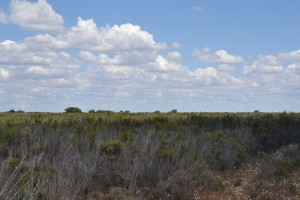The frequency and intensity of extreme climatic events are expected to be increase in the future according to climate change predictions. Researchers from “Instituto de Recursos Naturales y Agrobiología de Sevilla (IRNAS)”, “Centro de Investigación Ecológica y Aplicaciones Forestales (CREAF)”, “Estación Biológica de Doñana (EBD)” and “Universidad de Córdoba (UCO)” have collaborated in a study with the final aim of exploring the main changes in the shrublands of Doñana National Park in response to an extreme climatic event that occurred in 2005. Very low values of temperatures and precipitation were registered during this year compared with the averaged values of the area. These harsh climatic conditions caused very high mortality rates in plant communities, which are primarily dominated by shrub species.
Results from this study showed that no all plant species responded in a similar way to the climatic event, and their particular responses were largely determined by the possession of certain functional (attributes) traits. This study highlights the importance of using the functional approach as a useful tool to forecast ecosystem responses to future environmental fluctuations.
The main results of this study have been recently published in Oecologia:
Lloret, F., de la Riva, E.G., Pérez-Ramos, I.M., Marañón, T., Saura-Mas, S., Díaz-Delgado, R. & Villar, R. (2016) Climatic events inducing die-off in Mediterranean shrublands: are species’ responses related to their functional traits? Oecologia 180: 961–973
Additionally, several outlines of this study have been published in different electronic release media:
- Fundación Descubre: https://fundaciondescubre.es/blog/2016/03/07/raices-semillas-y-hojas-que-se-adelantan-al-cambio-climatico/
- La cuadratura del Círculo: http://www.eldiario.es/andalucia/lacuadraturadelcirculo/responde-vegetacion-evento-climatico-extremo_6_504359560.html
- CREAF: http://blog.creaf.cat/es/noticias/los-matorrales-de-donana-afectados-por-anomalias-climaticas-extremas/

